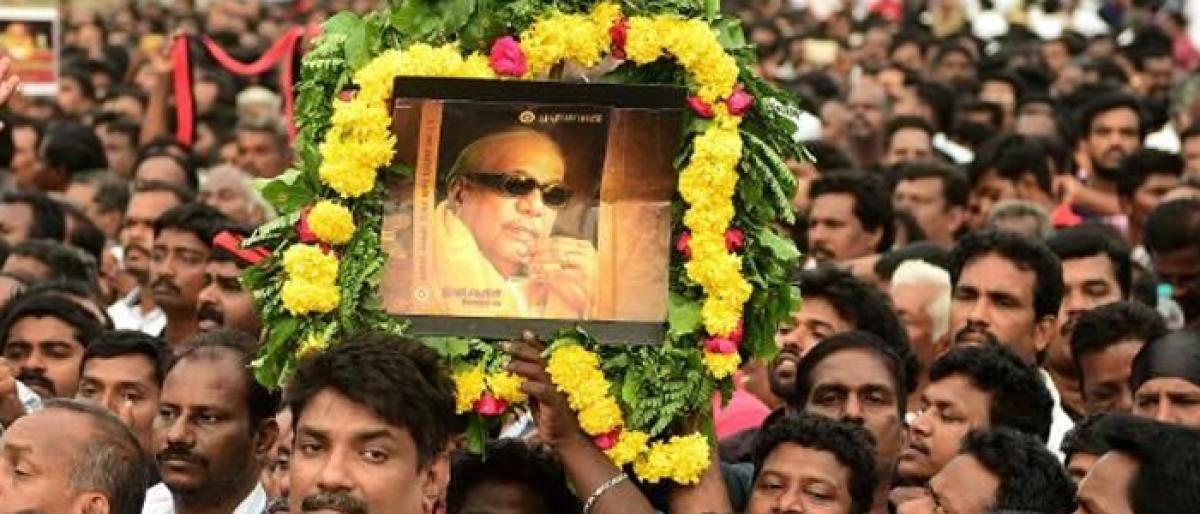When graveyards are divided on political lines

The last Moghul Emperor in India, Bahadur Shah Zafar, who died in captivity in then Burma, famously lamented Do gaz zameen bhi na mili, kooheyaar main Such is the ardent desire of human beings to return to the dust of their motherland after the demise
The last Moghul Emperor in India, Bahadur Shah Zafar, who died in captivity in (then) Burma, famously lamented - ‘Do gaz zameen bhi na mili, kooh-e-yaar main.’ Such is the ardent desire of human beings to return to the dust of their motherland after the demise.
Last rites and memorials are a matter of concern, in particular, for political leaders. There are solemn and dignified memorials, in our capital city Delhi, for every Prime Minister, with the sole exception of P.V. Narasimha Rao. The followers of PV sulked but kept quiet when the Indian government declined the proposal for the erection of a memorial at Delhi after his demise.
Last week, however, the followers of the late Karunanidhi did not stop merely at resenting at State government’s decision in respect of a Marina beach burial, but went to the High Court to press their demand. It was in this context that many intriguing arguments came to the fore. After hearing those, the doubt arises as to what really amounts to a ‘decent burial’.
When DMK’s founder C.N. Annadurai passed the way in 1969, his memorial was erected at Marina. As visitors to the beach also began to pay their homage at that site, the place became popular. Subsequently, when former Chief Ministers Rajaji (in 1972), Kamaraj (in 1979) and Bhaktavatsalam (1987) died, the then Chief Ministers, Karunanidhi and MGR, allotted land for erecting memorials for them next to the Gandhi Memorial in Guindy.
When MGR passed way while in office as Chief Minister, MGR’s body was buried, and a memorial erected at Marina. Later on, when his wife and former Chief Minister Janaki Ramachandran died in 1996, the then Chief Minister Karunanidhi, did not allot a place at Marina, reportedly saying that only Chief Ministers who died while in office would have their memorials there.
But, in 2016, when Jayalalitha died in office and a memorial was to be made up at Marina, some sympathisers of DMK filed Public Interest Litigation (PIL) petitions in Madras High Court against that move. Some said Marina Beach should not be converted into a graveyard. It was against this background that the death occurred last week of Sri Karunanidhi, a former Chief Minister.
On grounds of past precedent, the state government allotted two acres of land next to the Gandhi Memorial in Guindy. Not only were the DMK leaders not happy with that decision but, taking it as an insult, approached the High Court which constituted an emergency bench, rushed through the procedure of hearing arguments and promptly delivered a judgement. When the state government reminded the Court about the pending PILs, three of the four petitioners withdrew their petitions, while the fourth, who was an environmentalist, took the stand that he would not withdraw the petition but would also not object to a memorial being erected for Karunanidhi. One wonders whether environment concerns are linked to political considerations! Anyhow, the High Court directed the government to provide a place for Karunanidhi’s mortal remains at Marina.
The stand taken by the DMK in this context was curious, to say the least, as was the manner in which its arguments were put forth. Apparently the final resting place of the Dravidian leaders is the Marina Beach, while that of those belonging to the Congress party is Guindy. The practice of having different graveyards for people of different faiths is age old. But now, a time appears to have come when graveyards are divided on political lines! What is to be done in respect of those who started off in the Congress party and have now joined the DMK? This argument, however, was opposed by the government pleader, who stated in the Court that the memorial of ‘Periyar’, the founder of the Dravidian movement was in Vellore and not in Marina. He also reminded the Court that the memorial of ADMK leader Janaki Ramachandran was also not in Marina.
The lawyer representing DMK argued that if Karunanidhi was to be buried by the side of Rajaji, Kamaraj and Bhaktavatsalam, it would not amount a decent burial; and, that such a decision would amount to an infringement of the fundamental right guaranteed by Article 21 of the Indian Constitution which, according to that argument, includes the right to a decent burial. Clearly this raises many questions. Were not Congress leaders such as Rajaji decent people? Would the mortal remains, as well as the memory of Karunanidhi, get sullied merely on account of having been buried alongside such people? And why is this new concept of untouchability among departed souls is being put forth by those avowedly practising a creed sworn to opposing the same evil in respect of living persons?
The members of Dravidian parties, who had earlier led social movements against discrimination on the grounds of religion, caste or community, appear to be erecting new barriers now. It is also being argued that as Jayalalithaa was buried at Marina, not permitting a similar treatment to Karunanidhi’s body would amount to infringement of article 14, namely the right to equality. Imagination boggles at contemplating the sort of endless complications that would arise if one were to accept the argument that the Constitution gives a person the right to choose the place of burial. What if a person chooses Mount Kailash as his last resting place? What if a person were to demand that her memorial should be alongside that of Mumtaz Mahal at the Taj or, for that matter, another person were to demand that his remains not being consecrated at the Raj Ghat, along with Gandhi, would amount to a violation of his right to equality?
Another argument put forth was that “loved ones should be buried along with their mentors; only then it (sic) can be termed as a decent burial”. All one can say about their stand is that, there can be no one more beloved to a person then the spouse. Would that mean that, in the future when a political leader dies, next to his grave, a place for his wife too should be reserved? If the emphasis is on ‘mentor’ and not ‘loved one’, great persons such as Gandhiji, Anna and Kamaraj had many followers. Should all of them have been buried with their mentors? Karunanidhi for that matter, had tens of millions of followers. Should places be kept in the Marina for them all?
It is difficult to say which among the arguments advanced was actually taken into account by the Court while arriving at the verdict, as only the operative part containing the expression considering the exigency involved..’ has been released.
Kalaignar Karunanidhi was a great leader and no more can have an issue with his having been buried at the Marina Beach. The point being made that the arguments used in defence of the choice of the place smack of a personality cult and, also, a regrettable lack of concern for the protection of the environment. All over the world, the dead are respected and, even in respect of the dead bodies of enemy soldiers, last rites are conducted with deep respect and solemn dignity. But when followers of a leader wrangle over place of burial and start grading the places of burial on a ‘decency’ scale, it does not go down too well.
One also notes the underlying, though unstated, element of threat in the reference to the consequences of the demand not being met. This does not bode well for the future. The threat of an agitation and the dire consequences that to follow non-compliance with the demands of the agitators can hardly be a proper ground for the authorities to act. Courts of the law and governments should be spared the embarrassment of having to act on considerations not entirely pertaining to the public good and the law.











